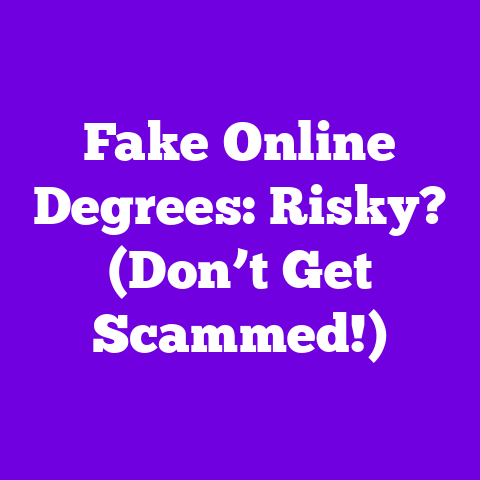Degree in Paranormal Science (Is It Real?)
Imagine this: You’re sitting in a dimly lit classroom.
Posters of ghostly apparitions and UFO sightings adorn the walls.
An enigmatic professor holds a crystal ball, ready to delve into the unexplained.
Sounds like a movie, right?
But what if this was a real degree program?
Let’s explore the fascinating and often controversial world of paranormal science.
Is a degree in this field actually viable for 2025?
Defining Paranormal Science
What exactly is paranormal science?
It’s the study of phenomena that fall outside the realm of conventional scientific understanding.
Think ghost hunting, ufology (the study of UFOs), cryptozoology (the search for cryptids like Bigfoot).
And psychic studies (ESP, telekinesis).
These fields often lack empirical evidence, making them controversial in the scientific community.
Historically, these investigations were conducted by enthusiasts and amateur researchers.
But now, they’re slowly creeping into academic discussions.
The Emergence of Academic Programs
Believe it or not, some institutions have started offering courses and even degrees in this area.
These programs often blend scientific methodology with the exploration of unexplained phenomena.
While full-fledged “Paranormal Science” degrees are rare, related fields are gaining traction.
For example, some universities offer courses in parapsychology, focusing on psychic phenomena.
The University of Edinburgh in Scotland has a long history of parapsychology research.
Exploring consciousness and extraordinary experiences is their main goal.
Rhine Research Center is another notable institution in this field.
These programs typically include courses on:
- Research methods
- Statistics
- Psychology
- Critical thinking
They aim to equip students with the tools to investigate paranormal claims rigorously.
Public Perception and Skepticism
Let’s be real: Public perception is a mixed bag.
Some people are fascinated by the paranormal, while others are deeply skeptical.
According to a 2019 Chapman University survey, 57% of Americans believe that places can be haunted.
That shows a significant interest in paranormal beliefs.
However, skepticism remains prevalent, especially within the scientific community.
Students and professionals in this field face significant challenges, including:
- Stigma
- Lack of funding
- Difficulty in gaining credibility
Convincing skeptics requires solid evidence and rigorous methodology.
Case Studies and Evidence
Paranormal research is filled with intriguing case studies.
Take the Enfield Poltergeist case in England, which involved alleged paranormal activity.
Such as furniture moving and strange noises, in a family home.
Investigated in the 1970s, it remains a controversial case.
Some consider it evidence of paranormal activity.
Others suggest psychological factors or hoaxes were involved.
In academic settings, these case studies are used to teach critical thinking.
And how to evaluate evidence objectively.
It’s about questioning assumptions and exploring alternative explanations.
Technological Advancements in Paranormal Research
Technology has revolutionized paranormal investigations.
From EMF meters to thermal cameras, ghost hunters now have a wide range of tools at their disposal.
EMF meters detect electromagnetic fields, which some believe are associated with spirits.
Thermal cameras can identify temperature fluctuations that might indicate paranormal presence.
Software is also used to analyze audio and video recordings for anomalies.
These technologies are increasingly integrated into academic programs.
Allowing students to conduct more sophisticated research.
Interdisciplinary Approaches
Paranormal science isn’t just about ghosts and UFOs; it intersects with other fields.
Psychology helps us understand belief systems and why people experience paranormal phenomena.
Sociology examines how cultural factors shape our perceptions of the paranormal.
Anthropology explores how different cultures interpret and interact with the unexplained.
Future of Paranormal Science Education
What does the future hold for paranormal science education by 2025?
I believe we’ll see more universities offering courses in related fields.
Such as consciousness studies, anomalistic psychology, and cultural studies of belief.
These programs will focus on critical thinking, research methodology, and ethical considerations.
Potential career paths for graduates include:
- Research positions in academic institutions
- Media opportunities (documentaries, TV shows)
- Roles in public education (museums, science centers)
However, it’s important to manage expectations.
A direct “Paranormal Science” degree might not guarantee a specific job.
But it can provide valuable skills and knowledge applicable to various fields.
Ethical Considerations
Studying the paranormal raises ethical questions.
How do we ensure the well-being of individuals who have experienced paranormal events?
How do we avoid exploiting their beliefs or sensationalizing their experiences?
Researchers have a responsibility to be sensitive, respectful, and objective.
Informed consent is crucial when conducting research involving human subjects.
It’s about treating people with dignity and avoiding harm.
Conclusion: Is It Real?
So, is a degree in paranormal science “real” for 2025?
The answer is complex.
While a traditional degree might be rare, related fields are gaining academic recognition.
These programs offer valuable skills in critical thinking, research, and analysis.
Whether you believe in the paranormal or not, exploring the unexplained can be a worthwhile endeavor.
It challenges us to question our assumptions, expand our perspectives, and embrace the unknown.
Ultimately, the quest for understanding the mysteries of the universe is a journey worth taking.
It encourages us to consider our perspectives on reality, belief, and the unexplained.





